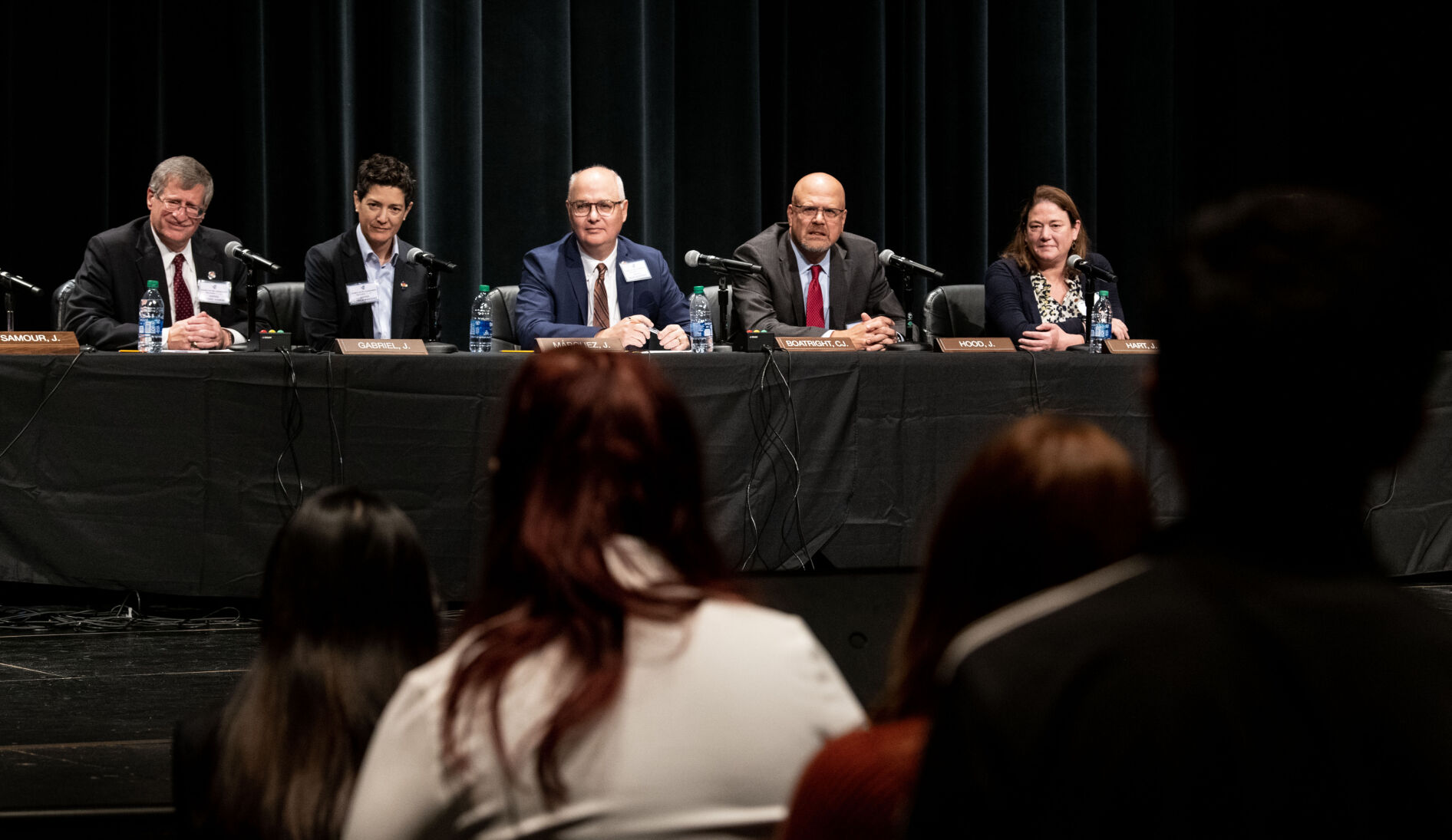Colorado Supreme Court to hear 2 criminal cases, school district dispute

The Colorado Supreme Court announced this week that it will hear a pair of criminal appeals questioning whether a murder suspect was in custody at the time of her interrogation, and whether police acted constitutionally when they executed an Internet-based search warrant.
At least three of the court’s seven members must consent to review a case on appeal.
A third case, involving the ability of school districts to block other districts from locating facilities within their boundaries, is also on the court’s docket.
The justices narrowly rejected another appeal implicating the constitutionality of Colorado’s court filing system, in which unrepresented parties generally do not have the ability to file electronically as lawyers do.
Miranda rights
Rachel Ann Niemeyer and her husband, Michael Adam Freese, had been drinking alcohol in their Craig motel room. At some point, Freese suffered a gunshot to the head. According to Niemeyer, Freese had been toying with a rifle and shot himself. He later died of his injuries.
Niemeyer repeatedly asked responding police to take her to the hospital to see Freese, but instead they drove her to the police station. They zip tied bags around her hands to collect gunshot residue and placed her in an interrogation room. A detective told Niemeyer she was not under arrest, but denied her request to go to the hospital.
Niemeyer answered questions about what happened in the motel room and acknowledged she was unsure whether she shot Freese. The detective then read Niemeyer her Miranda rights. She invoked her constitutional right to an attorney and police placed her under arrest. A Moffat County jury subsequently convicted Niemeyer of second-degree murder.
A three-judge panel of the Court of Appeals found police did not violate Niemeyer’s rights by allegedly placing her in custody and interrogating her without first giving a Miranda warning. A reasonable person in Niemeyer’s shoes, wrote Judge John Daniel Dailey, would not have considered their freedom restricted akin to an arrest.
Then-Judge David J. Richman disagreed that Niemeyer was not “in custody.”
“Taken together, the runaround by the police, the bagging of Niemeyer’s hands, and the circumstances of the interrogation,” he wrote, “lead me to conclude that a reasonable person in Niemeyer’s position would have considered herself to be deprived of her freedom of action to the degree associated with a formal arrest before the interrogation began.”
The Supreme Court will analyze whether Niemeyer was in custody and should have received a Miranda warning before answering questions.
The case is Niemeyer v. People.
The IP address
Law enforcement was investigating child pornography being downloaded to a specific Internet protocol (IP) address. They obtained a warrant to search computers at the entire property, with a particular suspect in mind. Once at the home, they unexpectedly learned Kevin Matthew Dhyne also lived there in a basement apartment. They searched his computer and found sexually exploitative material involving children. A judge found him guilty.
Dhyne attempted to have the computer evidence excluded from trial, alleging police violated his Fourth Amendment right to be free from unreasonable searches and seizures. The trial judge agreed, but believed police would have inevitably discovered the pornography by obtaining another warrant once they learned Dhyne lived at the property and used the IP address.
The Court of Appeals upheld the search by reasoning instead that probable cause of a crime extended to “common” areas of the property, which, in this instance, was an IP address.
The “search of Dhyne’s apartment was authorized by the warrant, notwithstanding his separate unit,” wrote Judge Neeti V. Pawar. Richman wrote separately, citing cases from outside of Colorado that found a search is lawful when the “entire premises” are suspect.
Dhyne appealed to the Supreme Court. The appellate decision “provides law enforcement with a ‘blank check’ to search anywhere and everywhere illegal activity may occur over an open IP address but having only performed the scantest of investigations regarding who the culpable party may be,” wrote attorney Adam M. Tucker.
The Supreme Court will review both the Court of Appeals’ and the trial judge’s rationales for upholding the search.
The case is Dhyne v. People.
A veto for school districts
Under Colorado law, school districts may link up to provide certain types of programming. Those arrangements are known as boards of cooperative educational services, or BOCES.
One such cooperative based around southern Colorado, known as ERBOCES, attempted to open a school aimed at students with dyslexia for the 2020-2021 school year. However, ERBOCES located the facility within the borders of Colorado Springs School District 11, which was not part of the co-op. District 11 did not consent to the new school and attempted to halt it, but an El Paso County judge ruled against the district.
The Court of Appeals reversed, finding Colorado law does not provide BOCES with “unrestricted extraterritoriality” to locate facilities outside their borders. ERBOCES then turned to the Supreme Court, arguing the appeals court misunderstood the law.
“Handing school districts a territorial veto will restrict educational opportunities, cast doubt upon cross-border BOCES programs, and foster needless litigation,” wrote attorney Ian Speir for the libertarian Independence Institute, which supported ERBOCES. “Worse, it endows districts with a new form of unchecked authority.”
Jon Caldara, president of the Independence Institute, is a Colorado Politics columnist.
The Supreme Court will evaluate whether the state constitution or statutes prevent BOCES from opening facilities in non-consenting school districts.
The case is Education ReEnvisioned BOCES v. Colorado Springs School District 11.
‘Enough is enough’
The Supreme Court also turned down a petition from Nina H. Kazazian, a former attorney representing herself. Kazazian filed a brief with the Court of Appeals in a case she was litigating, but on Dec. 2 the court rejected the document for failing to comply with numerous requirements and told her to refile within 14 days.
Kazazian did not have access to the online filing system as a self-represented party and she reportedly did not receive the court’s directive in the mail until Dec. 14. By that point, she had two days to submit a new brief.
“Because e-filing is the standard for the Courts and attorneys, precluding unrepresented parties from using the e-filing system infringes on unrepresented parties’ equal access to justice,” Kazazian explained to the Supreme Court.
The Court of Appeals ultimately denied Kazazian’s motion for an extension and dismissed her appeal after she did not file a new brief in time. The court indicated it reached its decision upon reviewing Kazazian’s motion “and the response.”
The response, filed by lawyer Michael G. Bohn, painted a detailed and disturbing portrait of Kazazian’s use of the court system. Beginning with a $2,000 dispute in her divorce case, Kazazian has spent roughly a decade pursuing litigation and costing Bohn’s clients hundreds of thousands of dollars in attorney fees.
An attorney discipline case against Kazazian accused her of filing frivolous legal actions, inappropriately contacting Bohn’s clients and attempting to pocket a payment she was ordered to turn over to the opposing party. Earlier this year, the presiding disciplinary judge disbarred Kazazian for her dishonesty.
Bohn also pointed out that Kazazian’s multiple cases in the Court of Appeals followed a similar pattern of filing non-compliant documents, receiving orders to clean up the briefs, and citing a multitude of reasons for needing the court to work around her schedule – for example, because she was going on a camping trip.
In other words, Bohn contended, Kazazian was manipulating the court.
“Enough is enough,” he wrote.
Justices William W. Hood III and Melissa Hart indicated they would have reviewed the Court of Appeals’ dismissal of Kazazian’s case and refusal to extend the deadline for filing a brief. Specifically, they wanted to address whether a constitutional violation occurs when self-represented parties cannot access the e-filing system and, consequently, do not have “equal access to the state judiciary.”
Currently, the Supreme Court is weighing a request from Bohn and others to bar Kazazian from ever filing a case on her own behalf again.
The case is Kazazian v. GHP Horwath P.C.











